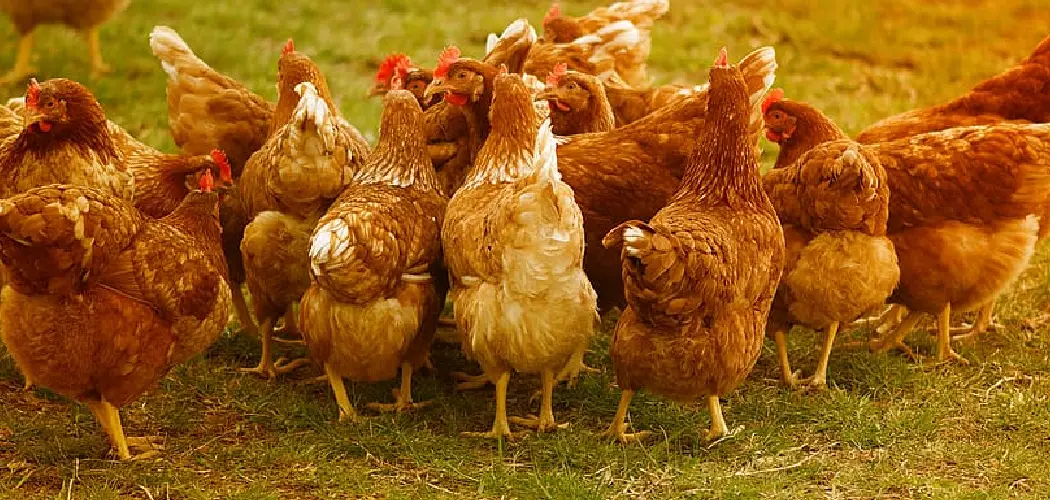Chickens make for delightful pets and provide a consistent supply of fresh eggs. However, anyone who has raised chickens knows that their coop can acquire a distinct odor that may become overbearing if not managed properly. This unpleasant smell can emanate from a buildup of droppings, bedding materials, and leftover food. It’s important for the health of both the chickens and the people around them to maintain a clean and odor-free environment.
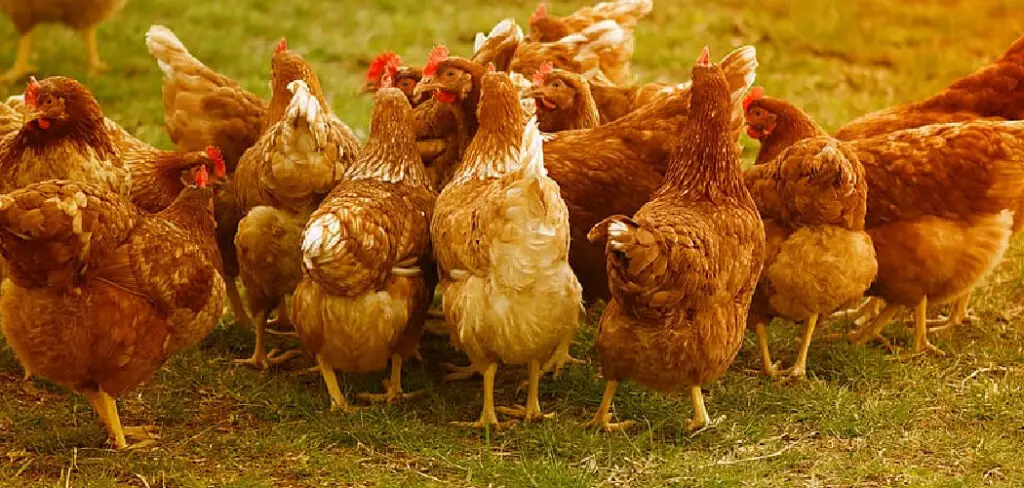
In this guide on how to get rid of chicken run smell, we’ll explore practical strategies to eliminate odors from your chicken run, ensuring it stays fresh and sanitary. From regular maintenance to natural odor neutralizers, we’ll provide you with a comprehensive plan to keep your coop smelling clean.
Understanding the Causes of Chicken Run Smell
Before we dive into the methods of getting rid of chicken run smell, it’s essential to understand the root cause. As mentioned earlier, the odor mainly stems from a buildup of droppings, bedding materials, and leftover food in the coop. These elements not only create an unpleasant smell but also attract insects and other pests that can harm your chickens.
Moreover, chickens produce a significant amount of ammonia in their droppings, which can be harmful to both humans and animals if not managed properly. Ammonia is a pungent gas that can irritate the eyes, nose, and throat when inhaled in high concentrations.
Why is It Important to Get Rid of Chicken Run Smell?
Besides the obvious displeasure, a smelly chicken coop can also indicate poor living conditions for your chickens. Ammonia buildup in the air can lead to respiratory issues and other health problems for both you and your feathered friends. In addition, an unclean chicken run can attract predators and spread diseases, jeopardizing the safety of your flock. But don’t worry, with a few easy steps, you can keep your chicken run smelling fresh and free from any potential hazards.
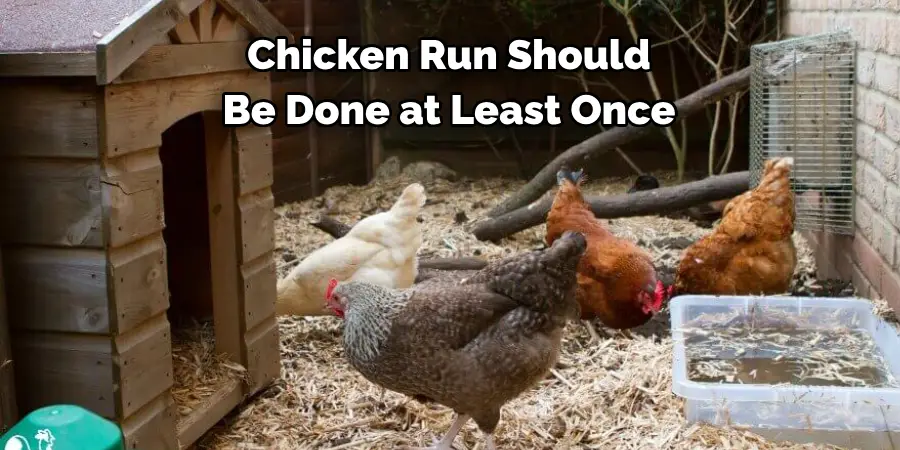
Maintaining a Clean and Dry Chicken Run
The key to preventing the buildup of odors in your chicken run is regular maintenance. This includes cleaning out the droppings, replacing bedding materials, and removing any leftover food.
Cleaning Out Droppings:
Removing droppings from your chicken run should be done at least once or twice a week, depending on the number of chickens you have. You can either use a rake or shovel to scoop out the droppings, or you can invest in a specialized manure fork for easier cleaning.
Once you’ve removed the droppings, make sure to dispose of them appropriately. Chicken droppings are an excellent source of nutrients for your garden, so consider composting them instead of throwing them away.
Replacing Bedding Materials:
Bedding materials such as straw, sawdust, or wood shavings not only provide a comfortable surface for your chickens to walk on but also absorb moisture and odors. It’s essential to replace these materials regularly to prevent the buildup of ammonia and other unpleasant smells.
Essential Materials
Apart from regular maintenance, you can also use specific materials to help neutralize odors in your chicken run. These include:
Lime:
Sprinkling lime in the coop helps neutralize ammonia and other harmful gases. It also has antibacterial properties that can help keep your chickens healthy.
Activated Charcoal:
Placing activated charcoal around the coop can absorb unwanted odors and moisture, keeping your chicken run smelling fresh. You can also mix it into the bedding materials for added effectiveness.
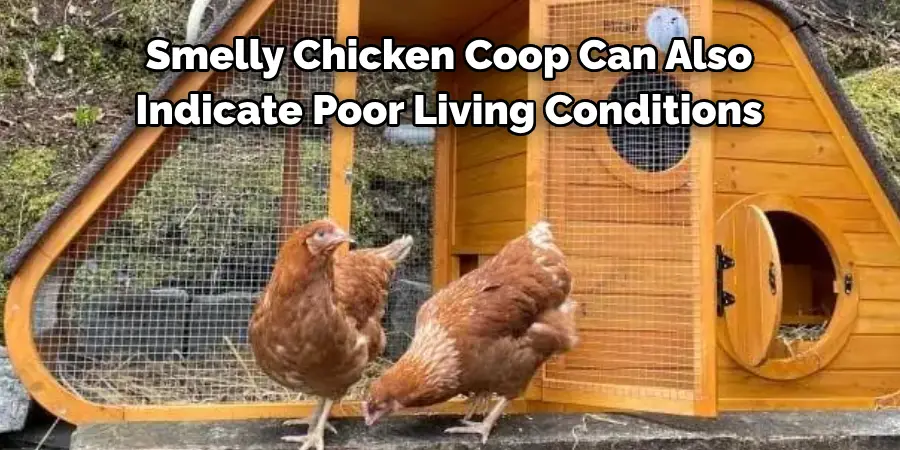
Herb Sachets:
Herbs such as lavender, thyme, and mint have a pleasant scent that can mask unpleasant odors in the coop. Making small sachets with these herbs and placing them around the chicken run can help keep it smelling fresh.
10 Simple Step-by-step Guidelines on How to Get Rid of Chicken Run Smell
Step 1: Maintaining a Clean and Dry Chicken Run
As stated earlier, regular maintenance is crucial in preventing the buildup of odors in your chicken run. Schedule a weekly or bi-weekly cleaning routine that includes scooping out droppings, replacing bedding materials, and removing any leftover food. You can also use a hose or pressure washer to rinse off any buildup on the coop walls and floor. But make sure to let the coop dry completely before adding new bedding materials. You can even consider adding a layer of sand on the coop floor, which absorbs moisture and helps keep the area clean.
Step 2: Proper Ventilation and Air Circulation
A well-ventilated coop with proper air circulation is essential in keeping the odor at bay. Make sure your coop has enough windows and vents for fresh air to flow through. You can also invest in a fan or ventilation system to improve airflow. It’s also crucial to keep the coop door open during the day, weather permitting. The fresh air and sunlight will help dry out any moisture, minimizing the chance of odors developing. But make sure to close the coop door at night to protect your chickens from predators. The key is to find a balance between fresh air and keeping your chickens safe.
Step 3: Natural Odor Absorbers and Deodorizers
As mentioned earlier, lime and activated charcoal are excellent natural odor absorbers. You can also sprinkle baking soda on the coop floor to absorb any lingering smells. Additionally, placing dried herbs such as lavender or rosemary in your chicken run can add a pleasant scent. Although these are natural methods, make sure to keep them away from your chickens’ reach as they may try to eat or scratch at them. It’s also essential to replace these materials regularly. But before using any natural odor neutralizers, make sure they are safe for use around animals.
Step 4: Landscaping Strategies for Odor Control
Landscaping around your chicken run can also help reduce odors. Planting fragrant herbs, such as mint or lemon balm, near the coop can help mask unpleasant smells. You can also consider planting tall bushes or trees to block any potential sources of odor from neighbors’ yards. It’s essential to maintain these plants and keep them trimmed to prevent them from becoming a haven for pests. But make sure to research which plants are safe for chickens before planting them. The last thing you want is for your chickens to ingest something toxic.
Step 5: Implementing Biosecurity Measures
Biosecurity refers to measures taken to prevent the spread of disease, pests, and other harmful substances. In the case of chicken run odors, it’s crucial to keep wild birds and rodents away from your coop. These animals can introduce unwanted droppings and bacteria into your chicken run, contributing to the odor problem. Make sure to secure any openings in your coop that could allow entry for these animals. You can also use wire mesh around your chicken run to prevent wild birds from entering. It’s also essential to keep your feed and water sources clean and covered to prevent attracting any pests.
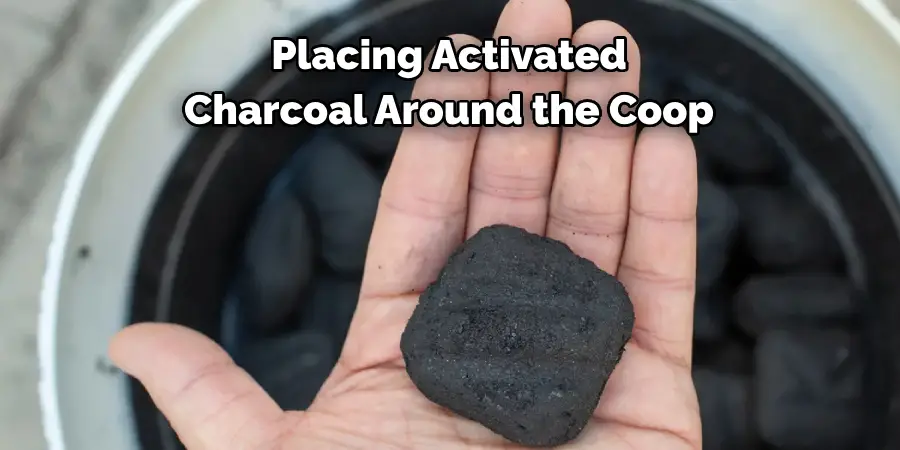
Step 6: Proper Waste Management
Aside from cleaning out droppings, it’s crucial to have a proper waste management system in place. This includes having designated areas for composting chicken manure and disposing of any other waste materials correctly. Improper waste disposal can lead to the buildup of odors and attract unwanted pests. Make sure to follow local regulations on waste management and dispose of any leftover food or waste in a safe and responsible manner. Otherwise, it can lead to a smelly and unhealthy chicken run. You can also consider using a deep litter system, where the coop floor is covered with a layer of bedding materials that decompose and turn into compost over time.
Step 7: Education and Community Involvement
If you live in a neighborhood or have neighbors nearby, it’s essential to educate them about your chickens and the steps you take to maintain a clean and odor-free environment. This can help prevent any potential complaints or conflicts in the future. You can also involve your community in composting chicken droppings for gardening purposes. It not only helps with reducing odors but also promotes sustainability and community involvement. The more people understand and support your efforts, the easier it will be to keep your chicken run smelling fresh.
Step 8: Probiotics for Chickens
Probiotics are live microorganisms that can help maintain a healthy balance of good bacteria in your chickens’ digestive system. Adding probiotics to their feed or water can help reduce the amount of ammonia present in their droppings, resulting in less odor. Make sure to consult with a veterinarian before introducing any new supplements to your chickens’ diet. Otherwise, it can do more harm than good. It’s also crucial to maintain good hygiene practices when handling probiotics to minimize any potential health risks.
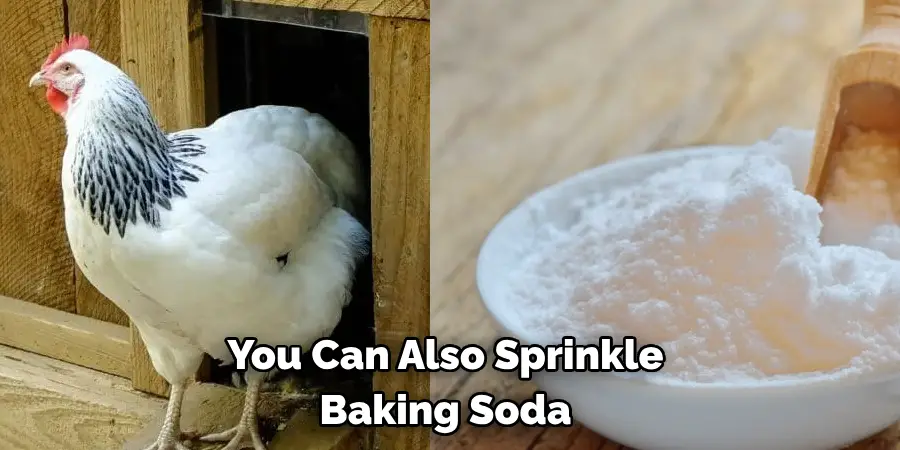
Step 9: Regular Health Checks for Your Chickens
A healthy chicken is less likely to produce strong-smelling droppings. Make sure to schedule regular health checks with a veterinarian and address any potential health issues that may contribute to odor problems. This includes maintaining clean and dry bedding, proper nutrition, and keeping your chickens’ living space clean and sanitized. But make sure not to use harsh chemicals or cleaners, as they can be harmful to chickens.
Step 10: Taking Care of Yourself
Last but not least, taking care of yourself is essential in maintaining a clean and odor-free chicken run. Make sure to wear appropriate protective gear when cleaning or handling your chickens to prevent any potential health risks. It’s also crucial to have proper handwashing practices in place before and after handling your chickens. Always remember to prioritize your safety and well-being when caring for your chickens.
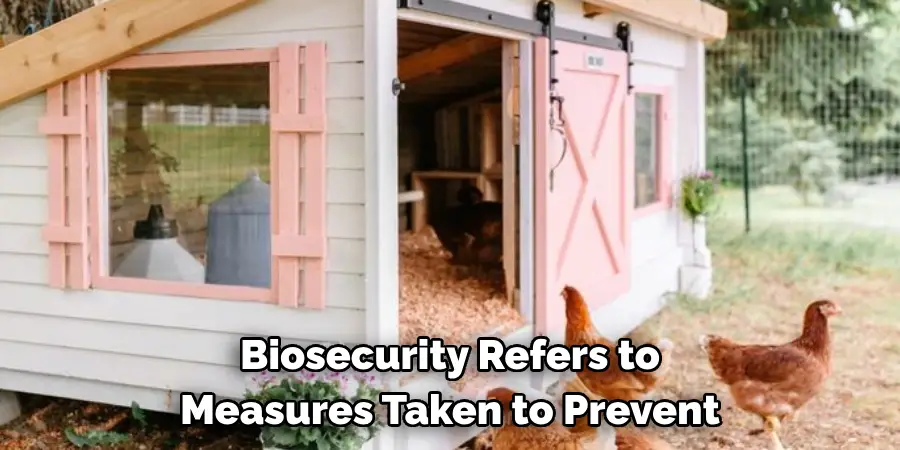
And don’t forget to give yourself a break and enjoy the benefits of raising backyard chickens, such as fresh eggs and a fun hobby! Remember, a happy chicken keeper makes for happy and healthy chickens. After following these strategies on how to get rid of chicken run smell, you should notice a significant improvement in the odor levels in your chicken run.
Troubleshooting and Advanced Techniques
If you’re still struggling to get rid of chicken run smell even after following regular maintenance practices, there are a few advanced techniques you can try.
Using Natural Odor Neutralizers:
You can make use of natural ingredients like vinegar, baking soda, and activated charcoal to absorb odors in your chicken run. Sprinkle these substances around the coop and let them sit for a few hours before cleaning them out.
Improving Ventilation:
Proper ventilation is crucial in preventing the buildup of moisture and odors in your chicken run. Make sure to have plenty of windows or vents that allow for fresh air to circulate. You can also install fans to improve air circulation.
Installing an Automatic Cleaning System:
For larger chicken runs, installing an automatic cleaning system can help with managing droppings and odors. These systems use sensors to detect droppings and automatically clean them out, reducing the need for manual cleaning.
Professional Cleaning Services:
If all else fails, consider hiring professional cleaning services specifically trained for chicken coops. They have the necessary equipment and expertise to thoroughly clean your chicken run, getting rid of any stubborn odors.
Remember, prevention is key when it comes to managing chicken run odors. By implementing these strategies and regularly maintaining your chicken run, you can keep it smelling fresh and healthy for both you and your chickens. So don’t let the fear of odor discourage you from raising backyard chickens and enjoy the many benefits they bring! Happy chicken keeping! Keep calm and cluck on.

Additional Tips
- Regularly Add Fresh Bedding to Your Chicken Coop to Absorb Moisture and Odors.
- Place Herbs Like Lavender, Mint, or Rosemary Around Your Chicken Run as Natural Air Fresheners.
- Avoid Using Pine Shavings as Bedding Material, as They Can Produce a Strong Ammonia Smell When Wet.
- Keep a Bucket of Sand Near the Entrance of Your Chicken Run for Chickens to Dust Bathe in, Which Can Help Reduce Odors.
- Incorporate Diatomaceous Earth in Your Chicken Run, as It Can Help Control Odors and Repel Pests.
- Clean and Sanitize Your Chicken Feeders and Waterers Regularly to Prevent Bacteria Growth, Which Can Contribute to Strong Odors.
- Avoid Overstocking Your Chicken Run, as Overcrowding Can Lead to an Increase in Droppings and Odors.
- Regularly Rake and Remove Any Uneaten Food or Debris From Your Chicken Run.
- Don’t Use Fresh Grass Clippings as Bedding Material, as They Can Quickly Become Moldy and Produce a Strong Odor. Instead, Use Dried Grass Clippings or Straw.
- Keep Your Chicken Run Well-maintained and Free of Debris to Prevent Odors From Accumulating.
- Consider Rotating Your Chickens’ Living Space by Using a Portable Chicken Coop or Tractor to Give the Ground Time to Rest and Restore Its Natural Balance.
- If You Have a Rooster, Consider Keeping Him in a Separate Coop to Reduce the Amount of Droppings and Odors in Your Chicken Run.
- Lastly, Don’t Be Afraid to Experiment With Different Techniques and Find What Works Best for You and Your Chickens. Every Chicken Keeper’s Situation is Unique, So Be Patient and Keep Trying Until You Find the Perfect Solution for Your Chicken Run. Happy Chicken Keeping! Keep Calm and Cluck on.
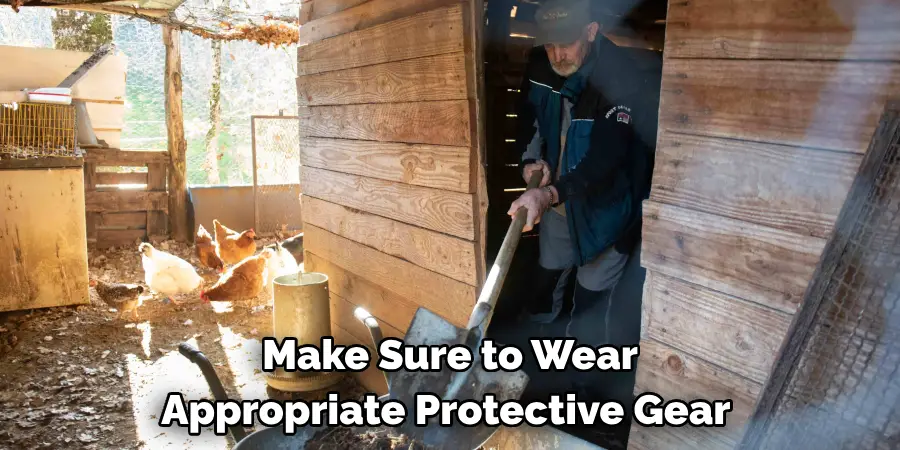
Frequently Asked Questions
Q: Will Keeping My Chicken Run Clean Also Prevent Flies and Other Pests?
A: Yes, regular maintenance of your chicken run will deter insects and pests from infesting the coop. You can also use natural pest deterrents like herbs and essential oils. It’s also essential to keep food and water sources clean to prevent attracting pests.
Q: How Often Should I Clean My Chicken Run?
A: Ideally, you should clean your chicken run at least once a week. However, this may vary depending on the number of chickens and the size of the coop. If you notice a strong odor or an increase in pest activity, it’s best to clean more frequently.
Q: Can I Use Chemical Odor Neutralizers in My Chicken Run?
A: It’s best to avoid using chemical odor neutralizers in your chicken run as they may be harmful to your chickens and the environment. Stick to natural methods for eliminating odors. But if you do choose to use chemical products, make sure they are safe for use around animals and follow the instructions carefully.
Q: Is There Anything I Should Avoid Feeding My Chickens to Prevent Odors?
A: Yes, certain foods like garlic and onion can contribute to strong odors in chicken droppings. It’s best to avoid feeding these types of foods to your chickens if you’re concerned about maintaining a clean and odor-free coop.
Conclusion
In conclusion on how to get rid of chicken run smell, maintaining a fresh-smelling chicken run is vital not just for your chickens’ health and happiness, but also for your enjoyment of your backyard. Regular cleaning, adequate ventilation, and the use of natural odor neutralizers can all contribute to a more pleasant environment. Remember that prevention is key; by setting up a proper routine and staying vigilant, you can keep odors at bay and ensure that your chicken run remains a clean and welcoming space for both you and your feathered friends.
About
Outdoor Fixes is a distinguished figure in the world of Diy design, with a decade of expertise creating innovative and sustainable Diy solutions.
His professional focus lies in merging traditional craftsmanship with modern manufacturing techniques,
fostering designs that are both practical and environmentally conscious. As the author of diy,
outdoorfixes delves into the art and science of outdoorfixes-making, inspiring artisans and industry professionals alike.
Education RMIT University
(Melbourne, Australia) Associate Degree in Design (Outdoor Fixes) Focus on sustainable design, industry-driven projects,
and practical craftsmanship. Gained hands-on experience with traditional and digital manufacturing tools, such as CAD and CNC software.
Nottingham Trent University
(United Kingdom) Bachelor’s in outdoorfixes.com and Product Design (Honors) Specialized in product design with a focus on blending creativity with production
techniques. Participated in industry projects, working with companies like John Lewis and Vitsoe to gain real-world insights.
Publications and Impact
In diy, Outdoor Fixes his insights on indoor design processes, materials, and strategies for efficient production.
His writing bridges the gap between artisan knowledge and modern industry needs, making it a must-read for both budding designers and seasoned professionals.

